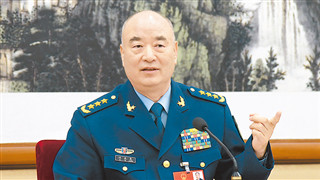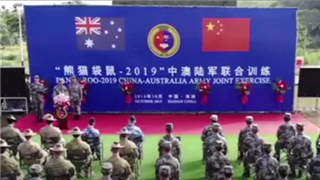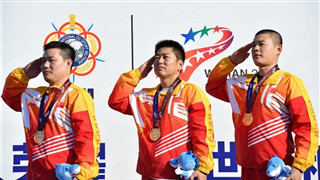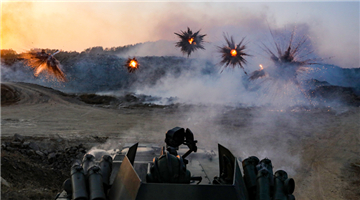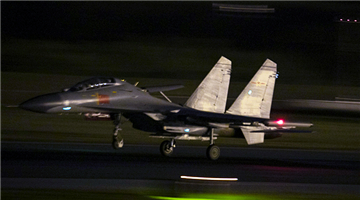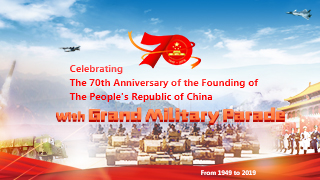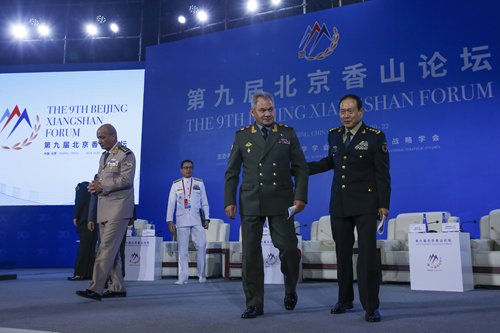
Defense ministers Sergei Shoigu of Russia (left) and Wei Fenghe of China leave the stage after the opening session of the Xiangshan Forum in Beijing on Monday. Photo: AP
China vowed to shoulder its international responsibility as a major country at a security forum in Beijing as the country's defense minister made an important strategic pledge to support peace, stability and cooperation in the Asia-Pacific region.
The Ninth Beijing Xiangshan Forum kicked off Monday. Chinese President Xi Jinping sent a congratulatory message to the forum, expressing China's commitment to advancing cooperation through dialogue, promoting peace though cooperation and safeguarding development through peace.
In the face of complicated security threats, countries need to stick together and uphold the UN-centered international system, Xi said. "It is our shared responsibility to improve the new type of security partnership, build a security architecture fitting the regional reality, and more effectively promote enduring peace and common security in the Asia-Pacific region," he said.
Chinese State Councilor and Chinese Defense Minister Wei Fenghe delivered a keynote speech at the opening ceremony, in which he blasted hegemony and power politics, saying that right choices must be made between peace and war, cooperation and confrontation, communication and isolation as well as win-win and zero-sum.
The international security system and order are facing serious challenges, and it is the common will of countries from all over the world to maintain mutual trust and realize mutual benefit, Wei said at the opening ceremony.
Wei did not name which country practices hegemony and power politics that caused the challenges, but Chinese analysts said the US obviously fits the role.
Wei Dongxu, a Beijing-based military analyst, told the Global Times Monday that the defense minister's speech represents a voice of justice and peace, as the US has been aggressive and wants to contain and threaten the development of other countries with its military strength.
Criticism and warnings against irresponsible US moves are demonstrations of China's international responsibility as a major country, Wei Dongxu said.
According to a statement China Association of Military Science, a co-organizer of the forum, sent to the Global Times, more than 530 participants from 76 official delegations including 23 defense ministers and six army chiefs had confirmed their attendance by Friday.
Bilateral and multilateral security cooperation is an important topic of discussion, said Wu Xinbo, director of Fudan University's center for American studies, noting that while the US was distancing itself from multilateral systems, China always promoted multilateral cooperation and multilateralism.
The Pentagon for the first time sent a delegation to the forum headed by Chad Sbragia, Deputy Assistant Secretary of Defense for China.
The US Secretary of Defense asked him to attend the forum, Sbragia said at a concurrent session on Monday.
Sbragia said the US does not want any country to choose sides between China and the US, and the competition between the two does not represent confrontation as the US still wants to build constructive relations with China and benefit the whole world.
An anonymous Chinese military expert told the Global Times that Sbragia's participation was a positive signal, given his rank and remarks at the forum, that the US was willing to manage differences with China to avoid misunderstanding and conflict.
However, the US might not put into practice all that Sbragia said, the expert noted. "Many actions the US has been doing are not consistent with what Sbragia said," the expert said.
"The US is saying one thing and doing another, as it still sees China as a strategic competitor that needs to be contained, which causes instability and risk in the Asia-Pacific region."
Chinese solution
The success of the Chinese people today is the result of their hard work, wisdom and peaceful path of development they have been walking on, rather than invasion, expansion and plunder, Wei Fenghe said.
China upholds a defensive national defense strategy and provides public security goods, including sending more than 40,000, or the most peacekeeping troops in the five permanent members of the UN Security Council, sending more than 100 warships on escort missions for Chinese and foreign civilian ships, and conducting over 100 joint exercises with more than 30 countries, Wei Fenghe said.
This not only shows the Chinese military has become an example of being a peaceful force, but China is also offering solutions to maintaining peace, stability and prosperity, Chinese analysts said.
Ma Jiali, director of the center for strategic studies at the China Reform Forum, a think tank affiliated with the Communist Party of China's Central Party School, told the Global Times that the Chinese and US militaries are fundamentally different because China wants to safeguard its own national security and also contribute to world peace, and it plays a positive and constructive role. The US, on the other hand, seeks hegemony and its own interests in a top-down dominant manner, Ma asserted.
Wang Honggang, a director at the Institute of American Studies with the China Institutes of Contemporary International Relations in Beijing, said China's influence in the security sector is increasing and has become a significant factor that can affect the trend of the entire security situation in the region.
The Defense Minister's remarks on China's peaceful development, contribution to developing security mechanisms and supply of public security goods were a "very important strategic promise to the region," Wang said.
Russian partnership
Russian Defense Minister Sergei Shoigu joined the Beijing Xiangshan Forum for the first time and delivered a speech on Monday, in which he spoke highly of rated China-Russia cooperation and questioned the US Indo-Pacific strategy.
Shoigu told the forum that the concept of an Indo-Pacific region as envisioned by the US does not have a clear geographic explanation and its strategic targets are also vague. The US Indo-Pacific strategy does not include all countries in the region, he noted.
The strategy might lead to the birth of an alliance of interest in the region and break the effective operation of the multilateral cooperation system of the region, Shoigu said.
Shoigu also said military cooperation has played an important role in the mutually beneficial ties of China and Russia.
Li Qingqing contributed to this story



